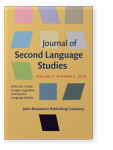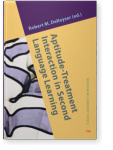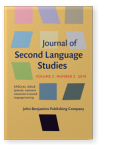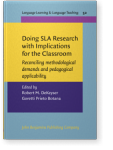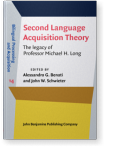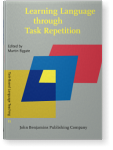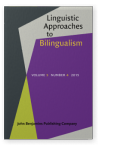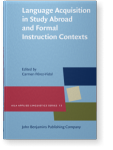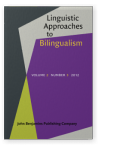Robert M. DeKeyser
List of John Benjamins publications for which Robert M. DeKeyser plays a role.
Journals
ISSN 2405-5522 | E-ISSN 2405-5530
Titles
Aptitude-Treatment Interaction in Second Language Learning
Edited by Robert M. DeKeyser
[Benjamins Current Topics, 116] 2021. v, 202 pp.
Subjects Applied linguistics | Language acquisition | Language teaching
Aptitude-treatment interaction in second language learning
Edited by Robert M. DeKeyser
Special issue of Journal of Second Language Studies 2:2 (2019) v, 200 pp.
Subjects Applied linguistics | Language acquisition | Language policy | Language teaching | Multilingualism
Doing SLA Research with Implications for the Classroom: Reconciling methodological demands and pedagogical applicability
Edited by Robert M. DeKeyser and Goretti Prieto Botana
[Language Learning & Language Teaching, 52] 2019. vi, 219 pp.
Subjects Applied linguistics | Language acquisition | Language teaching
2022 Chapter 10. Age effects in naturalistic and instructed second language acquisition: Two sides of one coin Second Language Acquisition Theory: The legacy of Professor Michael H. Long, Benati, Alessandro G. and John W. Schwieter (eds.), pp. 197–210 | Chapter
For more than half a century now the idea has been that children are better language learners than adults and that therefore second language learning in school should start early. Ironically, until fairly recently, the SLA literature on age effects, which was used to advocate foreign language in… read more
2021 Working memory and planning time as predictors of fluency and accuracy Aptitude-Treatment Interaction in Second Language Learning, DeKeyser, Robert M. (ed.), pp. 117–151 | Chapter
Working memory, which accounts for the ability to process information in the face of interference, is critical to second language acquisition (SLA) and use. The interaction of working memory capacity (WMC) with specific pedagogical interventions is a logical place for empirical SLA research, both… read more
2021 Aptitude-treatment interaction in second language learning: Introduction to the special issue Aptitude-Treatment Interaction in Second Language Learning, DeKeyser, Robert M. (ed.), pp. 1–4 | Chapter
2021 The interaction between timing of explicit grammar explanation and individual differences in second language acquisition Aptitude-Treatment Interaction in Second Language Learning, DeKeyser, Robert M. (ed.), pp. 33–68 | Chapter
Despite numerous positive findings of explicit instruction, this topic continues to engage scholars worldwide. One issue that may be crucial for the effectiveness of explicit instruction is the interaction between cognitive individual differences (language aptitude and working memory) and types… read more
2019 Working memory and planning time as predictors of fluency and accuracy Aptitude-treatment interaction in second language learning, DeKeyser, Robert M. (ed.), pp. 281–316 | Article
Working memory, which accounts for the ability to process information in the face of interference, is critical to second language acquisition (SLA) and use. The interaction of working memory capacity (WMC) with specific pedagogical interventions is a logical place for empirical SLA research,… read more
2019 Aptitude-treatment interaction in second language learning: Introduction to the special issue Aptitude-treatment interaction in second language learning, DeKeyser, Robert M. (ed.), pp. 165–168 | Introduction
2019 Chapter 1. Current research on instructed second language learning: A bird’s eye view Doing SLA Research with Implications for the Classroom: Reconciling methodological demands and pedagogical applicability, DeKeyser, Robert M. and Goretti Prieto Botana (eds.), pp. 1–8 | Chapter
In this introductory chapter we provide a picture of recent research on instructed second language learning (ISLA), not about its findings, but about what questions it addresses, on what aspects of the second language, and with what methodologies. We also address some potential reasons for why ISLA… read more
2019 The interaction between timing of explicit grammar explanation and individual differences in second language acquisition Aptitude-treatment interaction in second language learning, DeKeyser, Robert M. (ed.), pp. 197–232 | Article
Despite numerous positive findings of explicit instruction, this topic continues to engage scholars worldwide. One issue that may be crucial for the effectiveness of explicit instruction is the interaction between cognitive individual differences (language aptitude and working memory) and types… read more
2019 Chapter 7. The effects of multiple exposures to explicit information: Evidence from two types of learning problems and practice conditions Doing SLA Research with Implications for the Classroom: Reconciling methodological demands and pedagogical applicability, DeKeyser, Robert M. and Goretti Prieto Botana (eds.), pp. 127–154 | Chapter
The role of explicit information (EI) has long been debated in second language acquisition. Numerous studies report null effects for EI (e.g., VanPatten and Oikennon, 1996) calling for its diminution, whereas just as many point to its facilitative potential (e.g., VanPatten et al., 2013 and… read more
2018 Chapter 1. Task repetition for language learning: A perspective from skill acquisition theory Learning Language through Task Repetition, Bygate, Martin (ed.), pp. 27–41 | Chapter
This chapter looks at task repetition in second language learning from the point of view of skill acquisition theory and related areas of psychology. It explores not only what concepts like procedural and declarative knowledge, automatization, and transfer have to offer the applied linguist, but… read more
2014 Chapter 13. Research on language development during study abroad Language Acquisition in Study Abroad and Formal Instruction Contexts, Pérez-Vidal, Carmen (ed.), pp. 313–326 | Chapter
This chapter gives a brief overview of the main findings of the Study Abroad literature and situates the SALA Project against that background. It then provides suggestions for further research on some of the main issues that remain to be resolved: how do variables such as the social context of the… read more
2012
